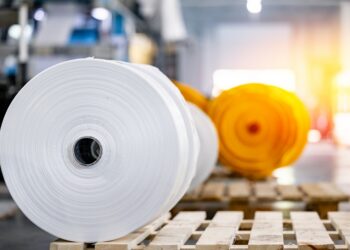The Recycling Partnership is gearing up to launch the Polypropylene Recycling Coalition to develop holistic solutions for diverting the growing array of packaging made with No. 5 plastic.
As the initiative takes shape, The Recycling Partnership is asking brand owners, converters and resin producers to join the conversation on how PP packaging applications that are not currently recycled could be in the future.
“You can’t just solve PP for one brand of yogurt,” said Keefe Harrison, CEO of The Recycling Partnership, which works with municipalities and others to increase access to curbside collection and improve recycling in other ways. “You have to think of all the applications of PP and get that critical mass. So if you produce or package in a PP tube or pouch, we’d like you to give us a call.”
The PP effort, expected to officially launch in the coming weeks, is a follow-up to The Recycling Partnership’s “Bridge to Circularity” report, published last year. The document noted the group would work to develop “a clear roadmap for how to move a package from technically recyclable to commonly accepted for recycling.”
“That report is basically our to-do list,” said Harrison.
Inspiration in the aisles
The need to develop a strong action plan around a variety of plastics was sparked in a big way by an interview Harrison did in the spring of 2019 with an NPR reporter.
Harrison accompanied NPR’s Rebecca Davis on a walk-through of a grocery store for a “Morning Edition” segment highlighting just how many items in today’s consumer marketplace are packaged in plastics that are not easily recovered.
“I really left thinking, ‘Man, this whole grocery store is film and pouches and wraps and flexible plastics,'” Harrison. “And do you know what a [materials recovery facility] wants? None of that.”

In addition, challenges around PP recovery have been in the news of late. The Sustainable Packaging Coalition’s How2Recycle label program recently announced it was reclassifying PP packaging from “widely recyclable” to “check locally.” And a report from Greenpeace highlighted low acceptance rates at MRFs for PP and other plastics Nos. 3-7.
Harrison, however, noted that building reliable long-term recycling frameworks for PP or other resins will require much more than just a single technological innovation or resident outreach effort.
“You can try to solve for PP by saying the MRF could sort more,” Harrison said. “That’s just one important step. We’re thinking of how to have the system ready for and hungry for tubes and pouches and other types that don’t currently enjoy strong recyclability.”
It’s for that reason that the Polypropylene Recycling Coalition is looking to involve the full value chain. An initial meeting earlier this year brought together brands and retailers. Now, the group wants to engage package designers and other experts.
At the same time, material processors will also get attention from the PP coalition.
Harrison said The Recycling Partnership is organizing a series of grants for MRFs looking to make improvements around sortation of plastics or other materials. This will be a new direction in grant allocation for The Recycling Partnership, which up until now has used that funding mechanism mainly to help municipalities purchase recycling carts and make other collection upgrades.
The MRF focus is one part of the PP coalition’s strategy to enhance material recovery by addressing all points in the value chain in a coordinated manner.
“What is the technological fix inside the MRF?” said Harrison. “And then how do you marry that with the consumer education piece and the material design piece? And then make sure that material will get to the end market? All this work has to happen in unison.”






























